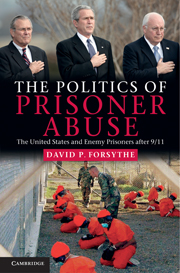Book contents
- Frontmatter
- Contents
- Preface
- List of abbreviations and acronyms
- 1 Torture and political morality in historical perspective
- 2 Political morality and the Bush Administration
- 3 Bush lawyers: the politics of legal interpretation
- 4 The military: Afghanistan, Guantánamo, Iraq
- 5 The CIA: kidnapping, Black Sites, extraordinary rendition
- 6 Due process: detention classification, Military Commissions
- 7 Prisoner abuse and the politics of transitional justice
- Annex A Cast of principal characters
- Annex B Reports on US policy toward enemy prisoners
- Annex C Some relevant legal norms: selected provisions
- Annex D Timeline, selected events, Bush Administration
- Index
- References
7 - Prisoner abuse and the politics of transitional justice
Published online by Cambridge University Press: 05 June 2012
- Frontmatter
- Contents
- Preface
- List of abbreviations and acronyms
- 1 Torture and political morality in historical perspective
- 2 Political morality and the Bush Administration
- 3 Bush lawyers: the politics of legal interpretation
- 4 The military: Afghanistan, Guantánamo, Iraq
- 5 The CIA: kidnapping, Black Sites, extraordinary rendition
- 6 Due process: detention classification, Military Commissions
- 7 Prisoner abuse and the politics of transitional justice
- Annex A Cast of principal characters
- Annex B Reports on US policy toward enemy prisoners
- Annex C Some relevant legal norms: selected provisions
- Annex D Timeline, selected events, Bush Administration
- Index
- References
Summary
Torture, its practice, its rationalization and legal justification, is one of the great moral issues of our time.
(Jorge Heine, “Closing Guantánamo,” The Hindu, May 27, 2009)The terrorist with weapons of mass destruction may very well put an end to our dream of a global community of human rights.
(Paul W. Kahn, Sacred Violence: Torture, Terror, and Sovereignty, Ann Arbor, University of Michigan Press, 2008, p. 178)Transitional justice (TJ), the process of establishing the proper and principled response to gross violations of human rights and humanitarian law, became a growth industry after the Cold War. Designed for small and weak states emerging from authoritarian brutalities or armed conflicts, it bedeviled the Obama Administration from 2009. International TJ developments created a context in which pressure built on Obama to deal with the abuses of the Bush era. When in 2010 the new UK government agreed to investigate the British role in US rendition and torture allegations, it was difficult to insulate US policy making from that inquiry. On the other hand, certain circles of opinion in Washington and the country itself could be quite insular and parochial, ignoring international trends and emphasizing strictly American perspectives – especially those prioritizing national security.
- Type
- Chapter
- Information
- The Politics of Prisoner AbuseThe United States and Enemy Prisoners after 9/11, pp. 192 - 230Publisher: Cambridge University PressPrint publication year: 2011

